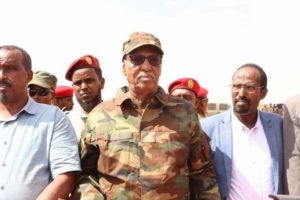
The announcement by Somalia’s Federal Member States in September that they’ve suspended cooperation with the Federal Government of Somalia has thrown the country into internal crisis. Amid numerous complaints, the member states are unhappy with resource and power allocation within Somalia’s federal structure. They also accuse President Mohamed Abdullahi Mohamed’s administration in Mogadishu of a lack of cooperation, and even outright interference in their local affairs.
While the dispute has played out differently in each of the member states, the ramifications have been most profound in Galmudug. Internal divisions in the Galmudug Interim Administration have been elevated by the dispute, with factions taking opposing sides in the debate. The roots of Galmudug’s crisis are complex, but the current rift stems from mediations last year between the Galmudug Interim Administration and Ahlu Sunna Wal Jama (ASWJ), held under the auspices of the Intergovernmental Authority on Development (IGAD).
In December 2017, a 14-point agreement was signed that integrated ASWJ into the Galmudug Interim Administration, uniting a state administration that had been divided since its formation in 2014-15. The integration of ASWJ proceeded in a positive manner, but it also created new divisions. The December agreement was based on a power-sharing arrangement, enticing ASWJ in part by allowing its leader Sheikh Mohammed Shakir to become chief minister. ASWJ also secured other key positions, while the state assembly and security outfits were expanded to include ASWJ members. But an IGAD representative involved in the mediation process told the Institute for Security Studies in Mogadishu that the creation of the chief minister position was the key dynamic, and ‘is how we unlocked it [the negotiations]’.
This was an important development, as ASWJ had previously rejected the Galmudug Interim Administration’s formation, feeling marginalised by the process. Given the military strength of the ASWJ’s position on the ground, it was imperative to come to an understanding in order to unite the administration, especially after previous integration agreements had floundered.
While the ASWJ-Galmudug Interim Administration reconciliation was a positive story, it produced new losers in the administration concerned about diluting their status in the new arrangement. This has led Galmudug to be divided between a faction in Adado, worried about becoming marginalised as the Galmudug Interim Administration was temporarily based here, and a second in Dhusamareb, the presumptive new capital following the ASWJ agreement.
A series of attempted no-confidence motions have flown back and forth between Galmudug’s Speaker of Parliament Ali Gacal Asir, who has remained in Adado, and its President Ahmed Dualle Haaf, now based in Dhusamareb and supported by the ASWJ. The Adado faction even went ahead with plans to elect a new Galmudug Interim Administration leader on 20 October, further adding confusion to the status of the administration.


